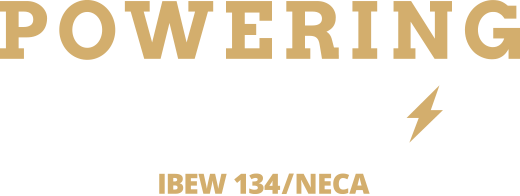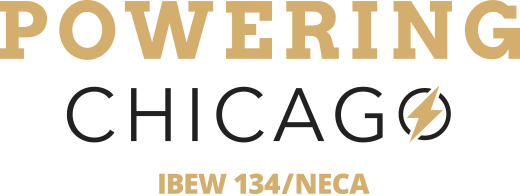Carole Pollitz on Breaking Barriers and Training Future Female Leaders
- Posted: March 24, 2021
- Apprenticeship Program, better careers, IBEW Local 134, YouTube
Breaking barriers wasn’t always in Carole Pollitz’s DNA. Before she became one of very few female apprentices at IBEW Local 134, she tried a more traditional path, planned out by her father. “My dad wanted me to go to college, but it just wasn’t for me. I floundered around and didn’t know what I wanted to do.” Carole found her place in 1986 when a friend suggested she check out an electrical apprentice program. By this point, she had dipped her toe into the world of contracting by working on a permit for three months. She liked what she was learning, the camaraderie and diversity of work, and signed on in one of the first apprenticeship classes focused on recruiting female candidates.
In the 35 years since, Carole has worked in the field as an instructor and currently, in the hall as IBEW Local 134 Renewable Energy Business Agent. Through it all, she’s been a tireless advocate, working to interest more women and minorities in electrical work, by supporting the recruitment and retention of her female colleagues in the heavily male-dominated field.
“I was the only woman in my apprenticeship class although there were several other women that broke through in the early 80s before me. We were spread out or scattered. It wasn’t quite the norm yet to see women in construction or in the classroom.”
Over her career, she’s helped complete commercial and industrial projects, many from the ground up, including one at the Cook County Jail. “I’ve worked on downtown high-rises, pharmaceuticals, and food processing, which was very, very cool to just see.” While on a site, Carole occasionally saw other women and would try to form a relationship, and together, they’d support each other when needed.
One of Carole’s proudest accomplishments is when, after 20 years in the field, she became an apprentice instructor. “The training program is one of the great things that we do, which gives younger people a chance to become exposed to the nature of our work and whether or not they want to continue.”
There weren’t any other female teachers at the time and it was a breakthrough for women. She primarily taught technical math blueprint, reading and code and found the impact she had on younger people very rewarding. Even more so, she paved the way for four women instructors who today help guide apprentices in the classroom.
Carole helps recruit female and minority apprentices to the program by attending fairs at high schools and community organizations like YWCA. With all the different types of work in the electrical industry today, especially with IBEW’s commitment to the renewable energy fund, there are going to be even more opportunities for women.
“Anytime I have an opportunity to talk to women to promote the industry, I do. I help them find their passion in any job and figure how to enjoy what they do every day. If that work includes being part of a construction team, I definitely encourage any woman to try it and see what’s involved to get in and complete the program. It’s not always easy and I let them know they have to be strong.”
She helps educate future generations that they can earn college credit while learning the trade. In addition, they are learning a lifetime skill. She enjoys sharing what she does with others, as it’s always an opportunity to open perspectives. “When people ask me what I do, and I say I’m an electrician, I see everything starts clicking in their mind. Usually, they move onto asking if I can help them with a project.
Even though she acknowledges the retention of women in the field is a challenge, it’s an important one, according to Carole. Seeing more women in leadership positions in the field or the hall, helps to show future generations the pace of change in the 121-year- old organization.
“We have a lot of women in different positions and this is a sign of change. I think people are accepting women in those roles. And I would hope that women could see myself and others that have gone through the years as an example that they can do it too. that, that know that they can do it too. I hope the more that women can see different avenues of stepping, we’ll continue to see more and more women joining us.”
Another big change Carole has seen in her three-decade career is a focus on issues central to women and minorities in the trades, namely talking about issues like sexual harassment and diversity training. “As we’ve seen an evolution of women in the trade, we have seminars that address harassment and diversity.”
In 2000, IBEW Local 134 adopted a sexual harassment policy and presented it to the apprentices. The policy originally was presented one time throughout an apprenticeship and now it’s required to be completed three different times. “I think it helps equip women and men, starting at the apprentice stage, to know how to handle certain things and how to make it a better place for everyone on the job site.”
Carole’s hope is with the union moving “along with the times” it will encourage more female and minority candidates to participate within the local as well.
One of her biggest lessons she imparts to first-year apprentices? “Don’t let anybody take the tools out of your hands. To learn it, you want to have the tools in your hand.”
She reflects back on when she told her dad she wanted to be an electrician and he shook his head. However, it didn’t take too long for him to understand that not only did she love what she was doing, she was getting many benefits beyond what he ever knew.
Carole looks forward to the day when women are training other women. “In many ways, we are the first generation of women to get from beginning to end. I think there’s going to be a lot of women out there that are training for the future. It’s happening now and will only keep growing.”

